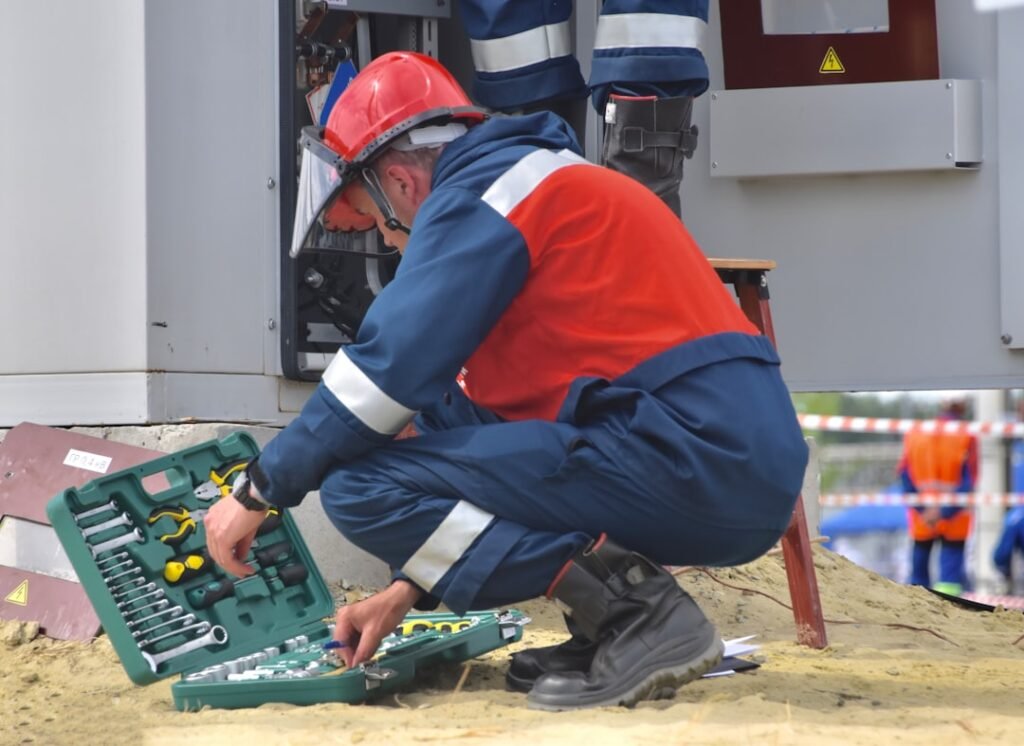Basic hand tools are essential for DIY enthusiasts and professional tradespeople alike. These versatile tools are used for a wide range of tasks, from simple home repairs to complex construction projects. Common basic hand tools include hammers, screwdrivers, pliers, wrenches, and hand saws.
Hammers are used for driving nails and fasteners into various materials. Different types of hammers, such as claw hammers, ball-peen hammers, and sledgehammers, are designed for specific tasks. Screwdrivers come in various sizes and types, including flathead and Phillips head, and are used for inserting and removing screws.
Pliers are multipurpose tools used for gripping, bending, and cutting materials. Wrenches, which include adjustable wrenches, socket wrenches, and open-end wrenches, are used for tightening or loosening nuts and bolts. Hand saws are used for cutting wood and other materials, with different types such as crosscut saws, rip saws, and coping saws designed for specific cutting tasks.
Basic hand tools are fundamental for any DIY project or construction task due to their versatility and ease of use. A good set of basic hand tools is essential for both professional tradespeople and DIY enthusiasts to complete jobs efficiently and effectively.
Key Takeaways
- Basic hand tools are essential for any DIY project and include items such as hammers, screwdrivers, pliers, and wrenches.
- Power tools, such as drills, saws, and sanders, can make tasks easier and more efficient, but proper safety precautions should always be taken when using them.
- Measuring and marking tools, like tape measures, levels, and chalk lines, are crucial for ensuring accuracy in any project.
- Safety equipment, including goggles, gloves, and ear protection, should always be worn when working with tools to prevent accidents and injuries.
- Fasteners and adhesives, such as nails, screws, and glue, are necessary for securing materials together in a project. It’s important to choose the right type for the job at hand.
- Painting and finishing tools, like brushes, rollers, and sandpaper, are essential for giving a project a professional and polished look.
- Specialty tools, such as pipe wrenches, tile cutters, and wire strippers, are designed for specific tasks and can be useful for more specialized projects.
Power Tools
Types of Power Tools
Drills are versatile tools that can be used for drilling holes and driving screws into surfaces. There are different types of drills, such as cordless drills, hammer drills, and impact drills, each designed for specific tasks. Saws are used for cutting wood, metal, and other materials, and there are different types of saws, including circular saws, jigsaws, reciprocating saws, and miter saws.
Sanders and Grinders
Sanders are used for smoothing out surfaces by removing material, and there are different types of sanders, such as belt sanders, orbital sanders, and random orbital sanders. Grinders are used for cutting, grinding, and polishing various materials, and there are different types of grinders, including angle grinders and bench grinders.
Importance of Power Tools
In conclusion, power tools are essential for any construction or DIY project. They can make tasks easier and more efficient, saving time and effort. Whether you are a professional tradesperson or a DIY enthusiast, having a good set of power tools is essential for getting the job done effectively.
Measuring and Marking Tools

Measuring and marking tools are essential for ensuring accuracy and precision in any construction or DIY project. These tools are used for measuring distances, angles, and dimensions, as well as marking surfaces for cutting or drilling. Some of the most common measuring and marking tools include tape measures, levels, squares, marking gauges, and chalk lines.
Tape measures are used for measuring distances and dimensions, and they come in various lengths and styles. Levels are used for ensuring that surfaces are horizontal or vertical, and there are different types of levels, such as spirit levels and laser levels. Squares are used for marking right angles and ensuring that surfaces are square, and there are different types of squares, including combination squares and framing squares.
Marking gauges are used for marking precise measurements on wood or other materials before cutting or drilling. Chalk lines are used for marking straight lines on surfaces over long distances. In conclusion, measuring and marking tools are essential for ensuring accuracy and precision in any construction or DIY project.
They help to ensure that cuts are straight, holes are drilled in the right place, and surfaces are level. Whether you are a professional tradesperson or a DIY enthusiast, having a good set of measuring and marking tools is essential for ensuring the quality of your work.
Safety Equipment
| Product | Price | Availability |
|---|---|---|
| Safety Goggles | 15.99 | In stock |
| Hard Hat | 25.50 | In stock |
| Safety Gloves | 12.75 | Out of stock |
Safety equipment is essential for protecting yourself from potential hazards while working on construction or DIY projects. These tools and equipment help to prevent accidents and injuries by providing protection for your eyes, ears, hands, head, and body. Some of the most common safety equipment includes safety glasses, ear protection, gloves, hard hats, and dust masks.
Safety glasses are essential for protecting your eyes from flying debris, dust, and other hazards while working with power tools or hand tools. Ear protection is essential for protecting your ears from loud noises produced by power tools or machinery. Gloves provide protection for your hands from cuts, abrasions, and other injuries while handling materials or using hand tools.
Hard hats provide protection for your head from falling objects or overhead hazards on construction sites. Dust masks provide protection for your respiratory system from inhaling dust particles or other airborne contaminants while working with materials or power tools. In conclusion, safety equipment is essential for protecting yourself from potential hazards while working on construction or DIY projects.
It is important to prioritize safety by wearing the appropriate safety equipment at all times to prevent accidents and injuries. Whether you are a professional tradesperson or a DIY enthusiast, having the right safety equipment is essential for ensuring your well-being while working on projects.
Fasteners and Adhesives
Fasteners and adhesives are essential for joining materials together in construction or DIY projects. These tools provide a secure connection between materials to create strong and durable structures. Some of the most common fasteners include nails, screws, bolts, nuts, and rivets.
Adhesives include glue, epoxy, silicone sealant, and construction adhesive. Nails are used for fastening wood or other materials together by driving them into the surface with a hammer or nail gun. Screws provide a stronger connection than nails by threading into the material with a screwdriver or drill.
Bolts and nuts are used for securing two or more materials together with a threaded connection. Rivets are used for joining metal sheets or components together by deforming the end of the rivet to create a strong connection. Adhesives provide an alternative method for joining materials together without the need for mechanical fasteners.
Glue is used for bonding materials together by creating a strong adhesive bond when it dries. Epoxy is a two-part adhesive that provides a strong bond between materials when mixed together. Silicone sealant is used for creating a watertight seal between materials in wet environments.
Construction adhesive is used for bonding heavy materials together with a strong adhesive bond. In conclusion, fasteners and adhesives are essential for joining materials together in construction or DIY projects. They provide a secure connection between materials to create strong and durable structures.
Whether you are a professional tradesperson or a DIY enthusiast, having a good selection of fasteners and adhesives is essential for completing your projects effectively.
Painting and Finishing Tools

Types of Painting and Finishing Tools
Some of the most common painting and finishing tools include paint brushes, rollers, sprayers, sandpaper, and putty knives. Each of these tools plays a crucial role in achieving a smooth and even finish.
How Painting and Finishing Tools Work
Paint brushes are used for applying paint to surfaces with precision and control by using different sizes and types of brushes for specific tasks. Rollers provide a faster method for applying paint to larger surfaces with even coverage by using different nap lengths for specific types of paint. Sprayers provide an efficient method for applying paint to surfaces with an even coat by using airless or HVLP sprayers for specific types of paint. Sandpaper is used for smoothing out surfaces by removing material before applying paint or finishes to achieve a smooth finish. Putty knives are used for applying putty or filler to surfaces to fill in gaps or imperfections before painting or finishing.
Importance of Painting and Finishing Tools
In conclusion, painting and finishing tools are essential for adding the final touches to construction or DIY projects by applying paint or finishes to surfaces. They help to enhance the appearance of surfaces by providing a smooth finish with even coverage. Whether you are a professional tradesperson or a DIY enthusiast, having a good selection of painting and finishing tools is essential for completing your projects effectively.
Specialty Tools
Specialty tools are designed for specific tasks in construction or DIY projects that require unique features or capabilities not found in basic hand tools or power tools. These tools provide specialized functions to complete tasks that cannot be accomplished with standard tools. Some of the most common specialty tools include pipe wrenches, tile cutters, drywall saws, wire strippers, and pipe cutters.
Pipe wrenches are used for gripping and turning pipes with adjustable jaws to provide a secure grip without damaging the pipe’s surface. Tile cutters provide a precise method for cutting ceramic tiles with straight edges using manual scoring wheels or electric wet saws. Drywall saws are used for cutting holes in drywall with sharp teeth designed to cut through gypsum board without tearing the paper facing.
Wire strippers provide a precise method for removing insulation from electrical wires with adjustable cutting jaws designed to strip wires without damaging the conductors. Pipe cutters provide a precise method for cutting pipes with sharp cutting wheels designed to create clean cuts without deforming the pipe’s shape. In conclusion, specialty tools provide specialized functions to complete tasks that cannot be accomplished with standard hand tools or power tools in construction or DIY projects.
Whether you are a professional tradesperson or a DIY enthusiast working on specific tasks that require unique features or capabilities not found in basic tools having a good selection of specialty tools is essential for completing your projects effectively.
FAQs
What are common tools that may need repair?
Some common tools that may need repair include power drills, saws, sanders, wrenches, and other hand tools.
What are some signs that a tool may need repair?
Signs that a tool may need repair include unusual noises, decreased performance, visible damage, or difficulty in operating the tool.
Can I repair my tools myself?
It depends on the extent of the damage and your level of expertise. Some minor repairs can be done at home, but for more complex issues, it’s best to seek professional help.
Where can I get my tools repaired?
You can get your tools repaired at a local hardware store, a specialized tool repair shop, or by contacting the manufacturer for repair services.
How much does tool repair typically cost?
The cost of tool repair varies depending on the type of tool, the extent of the damage, and the repair service provider. It’s best to get a quote from the repair shop before proceeding with the repair.


